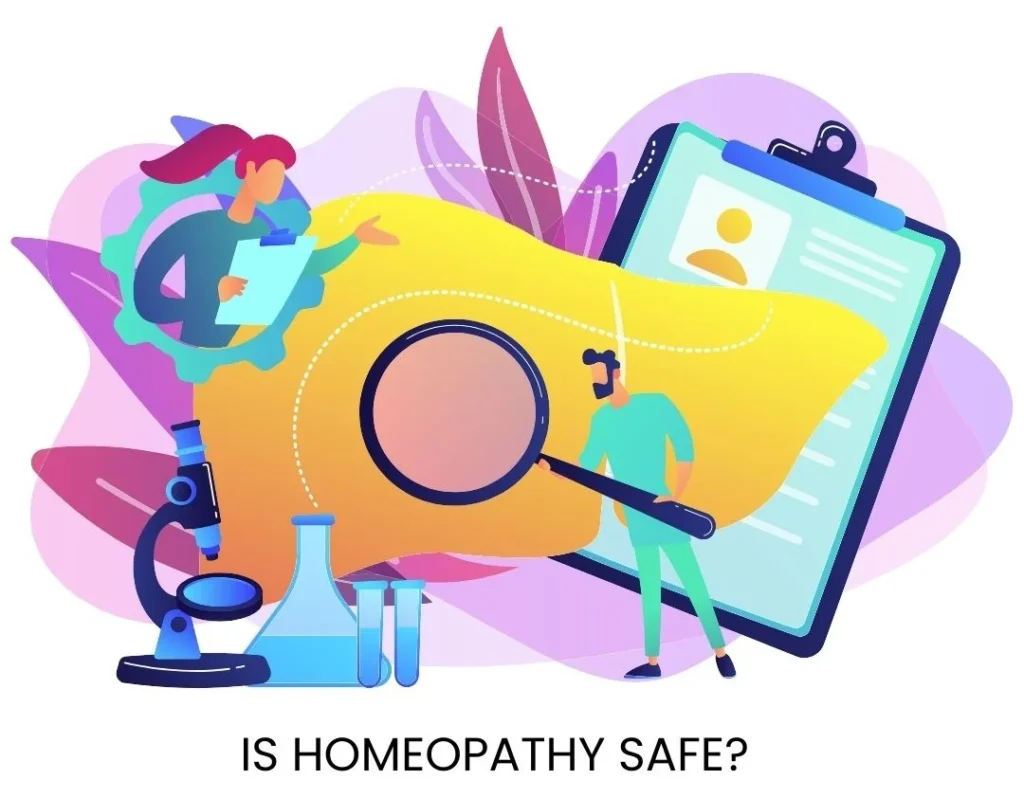Homeopathy is one of the most widely used systems of alternative medicine in the world. Yet, a common question remains: Is homeopathy safe?
While millions swear by its healing powers, skeptics and medical communities often question its scientific validity and safety.
This article offers a balanced, evidence-based exploration of the safety profile of homeopathy.
Whether you’re a patient, practitioner, or a curious reader, this guide will help you understand what science truly says about the risks, benefits, and concerns related to homeopathy.

Table of Contents
Toggle1. Understanding Homeopathy: A Quick Recap
Before diving into safety, let’s recap what homeopathy is:
- Founded by Dr. Samuel Hahnemann in the 18th century.
- Based on the principle of “like cures like“ — a substance that causes symptoms in a healthy person can treat similar symptoms in a sick person.
- Uses highly diluted substances prepared through a process called potentization.
These remedies are typically made from plant, mineral, or animal sources and are often diluted to such an extent that few or no molecules of the original substance remain.
2. Homeopathy’s Safety Record: What We Know
Homeopathy Is Generally Safe
- Extremely diluted remedies mean there’s virtually no toxicity.
- Very low risk of side effects or allergic reactions.
- Safe for infants, elderly, and pregnant women when used appropriately.
Conclusion: Homeopathy has a strong safety record, especially when compared to pharmaceutical medications.
WHO’s Statement on Homeopathy
The World Health Organization (WHO) acknowledges that homeopathy is widely used but has also warned against using it as a substitute for conventional treatment in severe or life-threatening diseases (like HIV, TB, or malaria).
3. The Scientific Debate: Efficacy vs. Placebo
One of the most controversial aspects of homeopathy is not its safety — but its effectiveness.
What Critics Say
- Critics argue that due to extreme dilutions, homeopathic remedies contain no active molecules, making them biologically inactive.
- Many scientific reviews have labelled it no better than placebo.
- Meta-analyses often show inconclusive or minimal benefits in large-scale trials.
What Supporters Argue
- Supporters cite clinical success, observational studies, and individual case reports.
- Homeopathy’s focus on individualized treatment makes it difficult to assess using traditional trial models.
- In real-world use, patient satisfaction and outcomes remain high, especially in chronic illnesses.
4. Common Misconceptions About Homeopathy Safety
“Homeopathy Is Always Safe”
While generally safe, self-prescription and poor case management can lead to:
- Delay in appropriate treatment
- Masking of symptoms
- Reliance on incorrect remedies
“Homeopathic Products Are Always Pure”
- Some over-the-counter (OTC) products may be contaminated or improperly prepared.
- A 2015 FDA warning noted inconsistent dosing in certain homeopathic teething tablets.
“Natural Means Safe”
- Not all natural substances are harmless. Even homeopathic remedies should be taken under supervision.
5. When Homeopathy Can Be Risky
Ignoring Emergency Medical Conditions
Using homeopathy as a substitute in serious, acute conditions (stroke, heart attack, cancer) without conventional care can be life-threatening.
Lack of Professional Guidance
Choosing remedies without proper knowledge can lead to:
- Inaccurate treatment
- Misinterpretation of symptoms
- Delayed diagnosis
Polypharmacy and Mixing Systems
Using multiple homeopathic remedies or mixing with other systems (e.g., Ayurveda, Allopathy) without guidance can confuse results or create interactions.
6. What Research Says About Long-Term Safety
Observational Studies
- A 2005 study in Germany found positive long-term outcomes and minimal side effects in chronic disease management using homeopathy.
Clinical Trials
- Trials show that adverse effects are rare, and when they occur, they are mild and reversible.
- A 2011 Swiss study concluded that homeopathy is comparable in effectiveness and safety to conventional treatment for certain conditions.
Homeopathy in Integrative Medicine
- Increasingly accepted in integrative and complementary medicine clinics.
- Especially beneficial in managing chronic, lifestyle, and stress-related conditions.
7. How to Use Homeopathy Safely
- Consult a qualified practitioner. Avoid self-medication beyond basic remedies.
- Be honest about your condition. Don’t hide symptoms or conventional medications.
- Monitor symptoms and improvement. Journal your progress.
- Know when to seek conventional care. Homeopathy complements; it doesn’t replace.
- Buy remedies from reputed pharmacies to ensure purity and potency.
Conclusion: Is Homeopathy Safe?
Yes — when used responsibly, homeopathy is generally safe for most people. The controversy lies more in its efficacy than its safety.
Scientific communities continue to debate its mechanism, but millions continue to benefit from its holistic, gentle approach to healing.
If you’re considering homeopathy:
- Know its limits.
- Use it under guidance.
- Combine wisdom with caution.
In the end, safety comes from informed, balanced healthcare choices — and homeopathy, when understood and practiced well, fits that bill for many.
Have thoughts or questions about homeopathy’s safety? Share your experiences in the comments below. Let’s keep the conversation honest and helpful!
